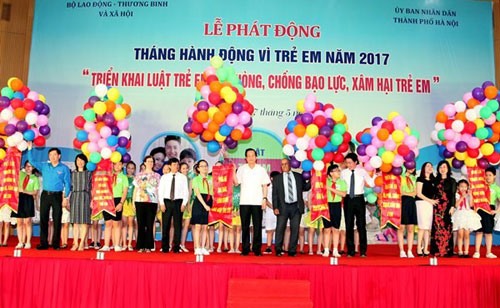 Society
Society

HÀ NỘI — The Ministry of Labour, War Invalids and Social Affairs (MoLISA) and the Hà Nội municipal People’s Committee has launched an action month for children themed ‘Enforcing Children Law and Preventing Child Abuse’ in Hà Nội.
 |
| Action month for children themed ‘Enforcing the Law on Children and Preventing Child Abuse’ is launched in Hà Nội on Saturday. — VNA/VNS Photo |
HÀ NỘI — The Ministry of Labour, War Invalids and Social Affairs (MoLISA) and the Hà Nội municipal People’s Committee has launched an action month for children, which starts on June 1 with theme of ‘Enforcing the Law on Children and Preventing Child Abuse’ in Hà Nội.
Speaking at the launch on Saturday, Vice President Đặng Thị Ngọc Thịnh asked ministries, sectors, organisations and local authorities, to widely disseminate the contents of the Law on Children, and Prime Minister Nguyễn Xuân Phúc’s directive on fighting child abuse.
She stressed the need to raise awareness and improve the knowledge and skills of parents, family members, teachers and those working with children, with regards to children protection and child abuse
Children must also be educated on how to protect themselves from violence and abuse, she added.
MoLISA Minister Đào Ngọc Dung said that this year’s action month included communications campaigns to disseminate the Law on Children, the programme on children protection for 2016-20 and the decree on defining a safe, healthy and friendly environment for children, plus a campaign to prevent violence in schools.
The ministry will also work with cities and provinces to host forums, seminars and conferences on preventing child abuse, as well as training courses on providing treating juvenile victims of abuse, particularly sexually abused children.
Decree tackles online dangers
From July 1, before publishing private information of a child on the internet, network service providers and individuals must have permission from the child’s parents or guardians and the child him/herself if he/she is above seven years old.
This is part of Government Decree 56/2017/NĐ-CP signed by Prime Minister Nguyễn Xuân Phúc, detailing articles of the Law on Children.
Children above the age of seven and parents or guardians may ask providers to delete all online images and personal information of their children to ensure their safety and interests.
Network service providers are also responsible for providing supportive measures and tools to protect children’s personal information online and, at the same time, publishing a list of online products and services safe for children and removing all images and content unsuitable for children.
The decree also clarifies the responsibilities of other individuals and organisations for raising public awareness about online dangers and responsibilities of families, schools, enterprises, communities and State management agencies in protecting children.
State management agencies of information and communications, education and training, vocational training and children, and organisations operating for children and online organisations must raise awareness of parents, caregivers, teachers, children and relevant organisations about the negative impacts of the internet on children, and build their capacity to prevent online child abuse.
Parents, teachers and child caregivers are responsible for safety skills for children when accessing the internet while children are obliged to practice safe surfing.
The decree also directs agencies, organisations, and individuals operating online to work with state agencies in ensuring information security for children on the internet and protecting children from harmful information. — VNS




